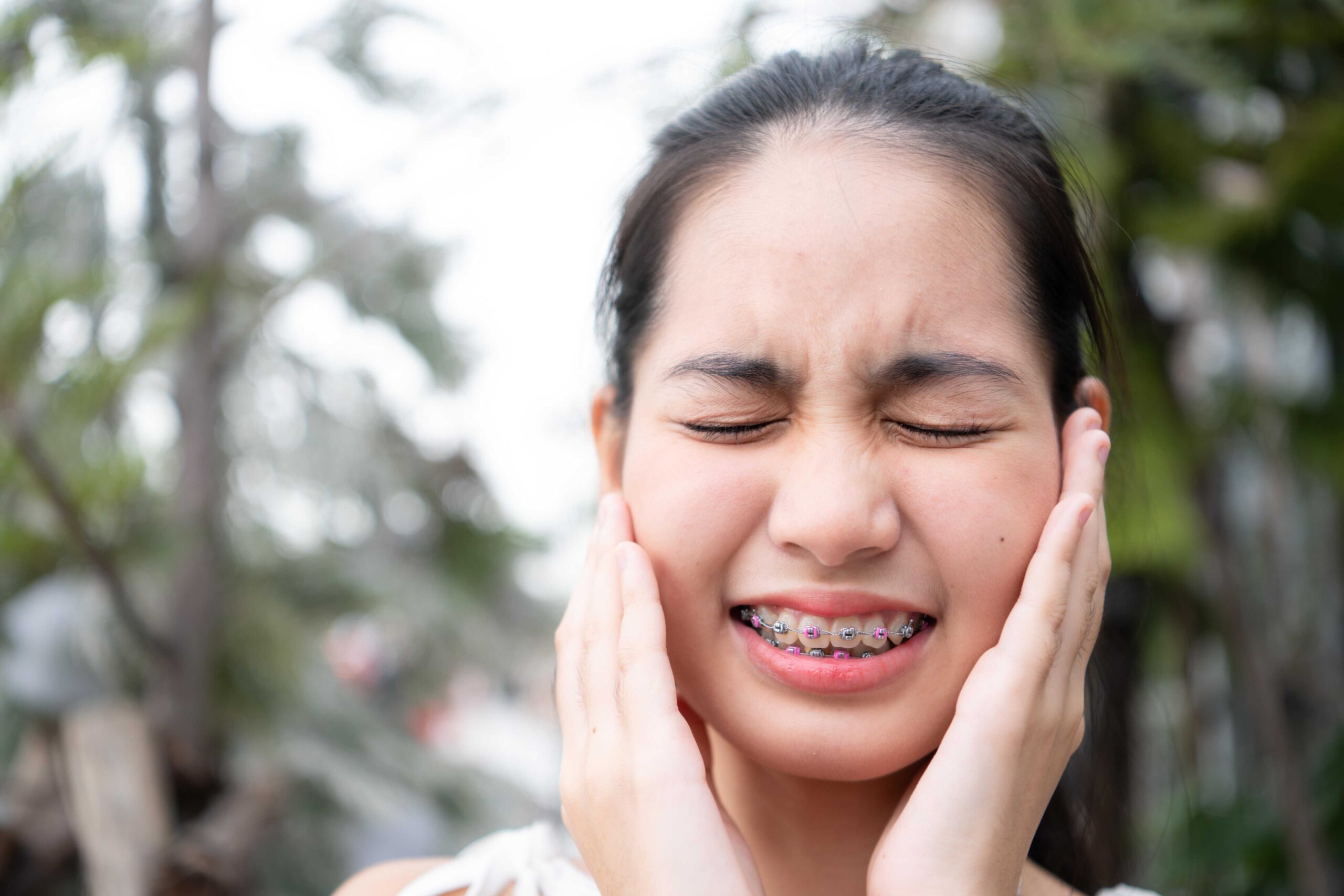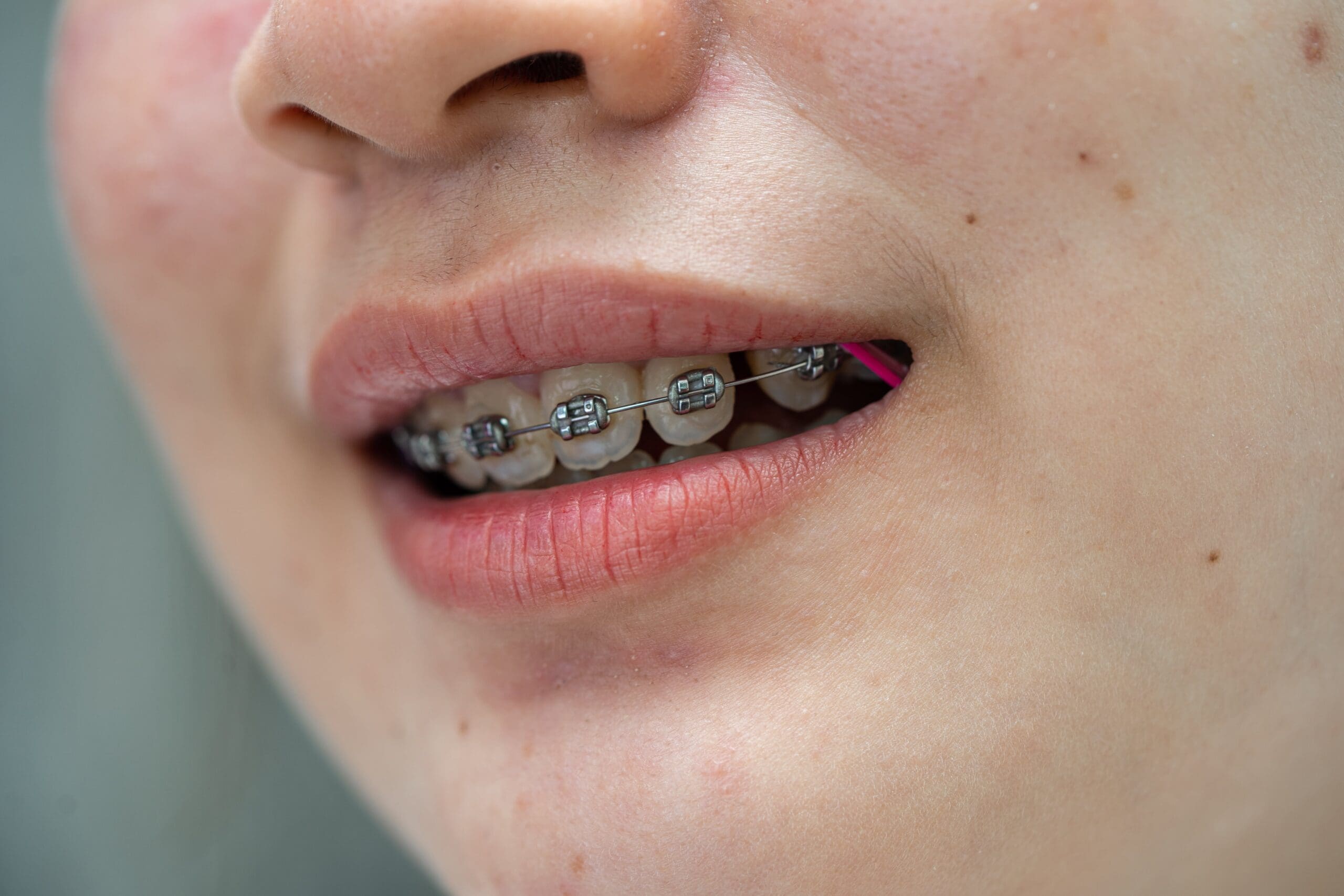Posted on September 17, 2025

Braces are a great way to achieve a healthier and more confident smile. However, they can cause some discomfort, especially when you first get them or after an adjustment.
At Smilebliss, we understand how challenging this can be, and we’re here to make your experience more comfortable. Contact us today to schedule a consultation and begin your journey toward a brighter smile!
Soreness from braces is normal and happens because they gradually move your teeth into position. This process puts pressure on your teeth and the surrounding bone, which can cause temporary discomfort. The soreness you feel shows that your treatment is progressing.
 Braces move your teeth slowly by applying steady pressure. This causes the bone around your teeth to break down in some areas and rebuild in others. This can cause dull aches or sensitivity, especially in the first 24-48 hours after getting braces or after adjustments.
Braces move your teeth slowly by applying steady pressure. This causes the bone around your teeth to break down in some areas and rebuild in others. This can cause dull aches or sensitivity, especially in the first 24-48 hours after getting braces or after adjustments.
You may feel this discomfort more when chewing. Luckily, this soreness fades as your teeth move into place. Soft foods and over-the-counter pain relief can help reduce the discomfort.
The brackets and wires on your braces can irritate the soft tissues in your mouth. This irritation is more noticeable after an adjustment and can cause soreness or small ulcers.
Applying orthodontic wax to the brackets can help reduce this irritation. Maintaining good oral hygiene is also important, as healthy tissues heal faster. Over time, your mouth will get used to the braces, and the irritation will decrease.
Every visit to your orthodontist may cause some discomfort as wires are tightened or bands are replaced. This discomfort usually lasts for a few days, but is necessary for your treatment.
Be ready with pain relief medications and soft foods to help manage the soreness. Though the discomfort is temporary, these adjustments are necessary to help you achieve your healthiest smile.
Braces discomfort varies depending on the stage of treatment and how your teeth respond. Knowing what to expect can help you manage it.
When you first get braces, your mouth will adjust to the new appliances. It’s normal to feel aching in your gums and teeth, especially during the first few days. This discomfort is usually at its worst during the first 24-48 hours but improves after a week or so.
Taking over-the-counter pain relievers like ibuprofen or acetaminophen and eating soft foods like mashed potatoes, yogurt, or soup will help. Be gentle when brushing, and use a soft-bristled toothbrush to avoid further irritation.
After each adjustment, your teeth may hurt for a few days. Eating can be uncomfortable, and your teeth may feel more sensitive.
Applying ice packs to your cheeks and drinking cold water can help soothe the pain. Avoid hard or chewy foods like nuts, caramels, and crusty bread that can make the soreness worse.
Sometimes, the wires or brackets on your braces can irritate your tongue, lips, or cheeks, leading to soreness. You can reduce this irritation by applying orthodontic wax to the sharp spots on the brackets.
If the irritation continues or gets worse, reach out to your orthodontist for adjustments. Rinsing your mouth with warm salt water can also help relieve irritation and promote healing.
Managing soreness is important for a smooth orthodontic experience. Here are some practical tips to help you stay comfortable throughout your treatment.
 Ibuprofen or acetaminophen can help reduce soreness and inflammation. Take the recommended dose one hour before your adjustment appointment to help minimize discomfort. Always follow the instructions on the label to avoid overuse.
Ibuprofen or acetaminophen can help reduce soreness and inflammation. Take the recommended dose one hour before your adjustment appointment to help minimize discomfort. Always follow the instructions on the label to avoid overuse.
Cold compresses can numb soreness and reduce swelling. Wrap ice or a cold pack in a soft cloth and apply it to your face for 10-15 minutes, several times a day.
Warm compresses help relax tight jaw muscles and improve blood flow. Alternating between cold and warm compresses can help manage discomfort.
Orthodontic wax helps reduce irritation from braces. It provides a smooth surface over sharp brackets or wires, preventing them from causing sores in your mouth.
Simply roll a small piece of wax into a ball, flatten it, and place it over the sharp spots. Be sure to replace the wax regularly to keep it effective.
Saltwater rinses are a simple but effective way to soothe sore gums. Mix one teaspoon of salt in a cup of warm water, swish it around for 30 seconds, and spit it out.
This rinse can help reduce swelling and promote healing. You can also use an antibacterial mouthwash to reduce pain and prevent infection. Rinse 2-3 times a day for the best results.
Numbing gels can provide fast relief for sharp pain. Apply a small amount directly to the sore area, and the gel will numb the nerves, easing the discomfort. Follow the instructions for safe use.
Eating soft foods can help reduce soreness, especially in the first few days after an adjustment. Soft foods are easier to chew and less likely to irritate your sensitive teeth and gums.
Stick to soft foods during the first few days after an adjustment to reduce discomfort.
Some good options include:
Certain foods can make soreness worse or damage your braces.
Avoid:
Drinking water is important for comfort and oral health. Water helps rinse away food particles and reduces irritation.
Staying hydrated also supports healing by improving blood flow and reducing swelling. Avoid sugary or acidic drinks like sodas and citrus juices, which can damage your teeth and braces.
While soreness from braces can be uncomfortable, it’s temporary. With the right care, it’s manageable. Soft foods, orthodontic wax, and salt water rinses will help ease discomfort.
Keeping your mouth clean will also help prevent further irritation and support healing. If the pain becomes unbearable or doesn’t improve, don’t hesitate to contact Smilebliss. Our team is here to guide you every step of the way.
Your healthier smile is just around the corner. Start transforming your smile and boosting your confidence today by scheduling a free consultation!